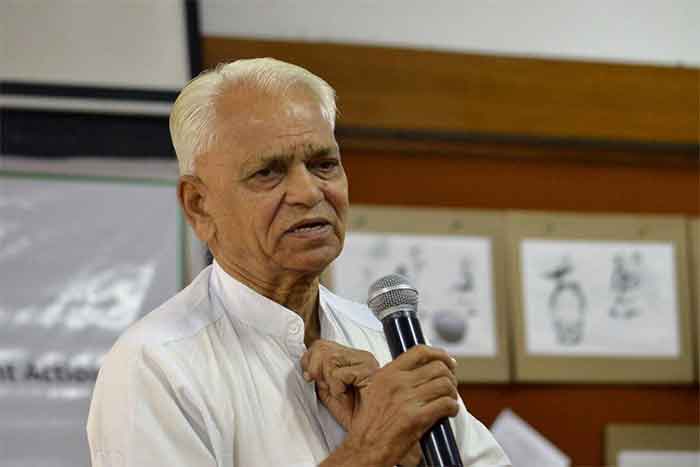
Eminent Gandhian S.N.Subba Rao is no more. He breathed his last at the age of 92 in Jaipur on October 27. He will be remembered by countless people for spreading the message of justice, peace and non-violence for over seven decades, but above all he will be remembered by those who had the cherished the experience of attending his youth camps. The Rajasthan Chief Minister Ashok Gehlot is apparently one of them. He said at Jaipur that he has still not forgotten the inspiring songs sung by Subba Rao which he first heard at the age of 10.
Salen Nanjundaaiah Subba Rao ( 1929-2021), often called Bhai Ji, was born in Bangalore. At the age of 13 he was greatly moved by the Quit India Movement and day after day he wrote slogans on walls asking the colonial rulers to leave India. The boy was arrested by the police, but let off after some time away. However he remained very much a part of the freedom movement during the nexr five years too.
After freedom initially he worked as a Congress and Congress Seva Dal member devoted to social work and constructive activities, but such was the enduring Gandhian impact on him that gradually he became a devoted sarvodaya social activist. In 1969 when the Gandhi birth centrenary was being observed, with government support he embarkd on a very interesting program of taking the message of Gandhiji in special trains whose various wagons had photos, at work and books relating to the life and message of Mahatma Gandhi.
In the early 70s he established the Mahatma Gandhi Sewa Ashram at Jaura, in Chambal region. This became a centre of various activities relating to the surrender of dacoits of Chambal. Before coming here Jaipraksh Narain, the eminent Gandhian leader, had met the Prime Minister Mrs. Indira Gandhi and obtained her good wishes for the entire effort, and after this the surender effort got even greater cooperation from the governments of Madhya pradesh( particularly its Chief Minister P.C.Sethi) Uttar Pradesh and Rajasthan. Several Gandhian leaders like Mahavir Bhai and Hem Sharma had helped to prepare the background for this surrender, amnd mong this the contribution of Subba Rao is comnsidered very important. His foresight in establishing the ashram at Jaura proved very helpful for the entire effort. Fittingly it was at Jaura that his last rites were performed on October 28.
While in April 1972 in the single most important surrender mnearly 200 dacoits surrendered, later numbers continued to be dded as more surrenders took place after the impact of the initiative spread. It was felt after some time that the steady erosion of land by the Chambal resulting in formation of ravines had to be checked to protect farming and livelihoods in Chambal. To inspire people for this and to focus attention on this challenge, Subba Rao organiized youth camps in which National social Service volluters and other students from schools and colleges, as ell as other youth, camped in villages and contributed voluntary labor for reclamation of ravines. I had gone to report on one such camp in a village of Chambal region when I first met subba rao Ji and he made a lasting impression on him. The songs he sang for motivating youth for serving people were very popular with all those attending the song. I was a just young reporter, but he gave me adequate time and a very patient hearing, despite being so busy with camp affairs. Establishing unity of people and motivating youth to overcome narrow divides, spreading communal harmony was another objective of these national unity camps. These camps organized in various parts of the country over a period of several decades made a very important contribution.
P.V. Rajagopal and Ekta Parishad initiated several efforts for land rights of the landless, tribals, dalits and other weaker sections. S.N. Subba Rao emerged as a mentor for all these efforts and at all the big gatherings of these efforts that I attended Bhai Ji, as Subba Rao was respectfully called by all his friends by now, was almost always present as the most honored speaker. This is a good indication of his stature as well as the respect he received instinctively.
However even as his stature continued to grow steadily, he retained a very frugal and simple style, whether in his clothing or food or abode. He travelled most of the time but if he happened to be in Delhi, then Room No. 11 at Gandhi Peace Foundation was the place to meet him. He always remained accessible and if you came at lunch time, chances ere you would also get a share of his favorite khichdi.
A man who was a living embodiment of peace, harmony, justice and unity has left us when these virtues are most needed in hs county.
Bharat Dogra is a journalist and author who has been close to several social movemets. His recent book on high relevance of Gandhian ideas for present times is titled Man Over Machine.
















































